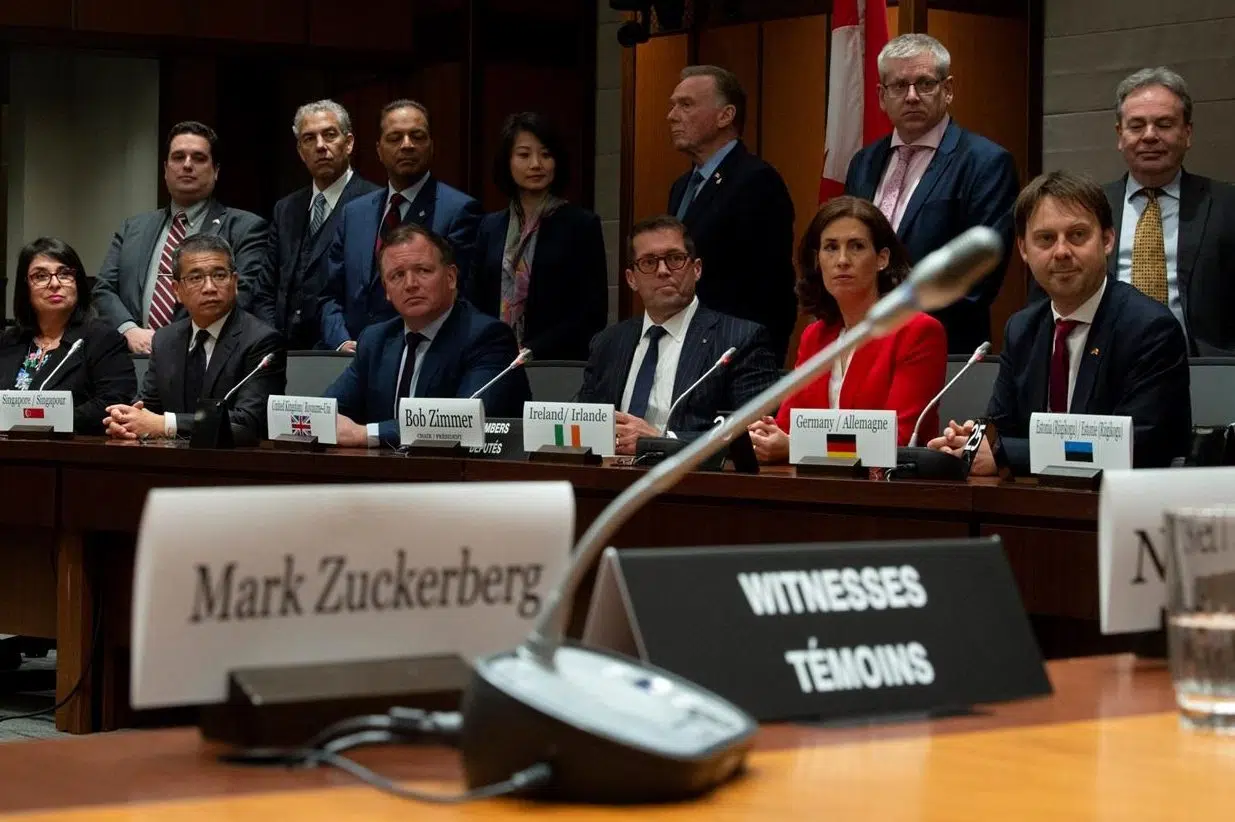OTTAWA — A panel of international politicians unleashed unbridled anger at Mark Zuckerberg and Sheryl Sandberg on Tuesday after the Facebook executives snubbed their summons to appear at the international grand committee on big data, privacy and democracy in Ottawa.
The committee’s chair, Conservative MP Bob Zimmer, called it “abhorrent” the two did not appear, and he closed a marathon session of testimony by telling the two Facebook employees who were sent in their place that it was “shameful” their bosses didn’t show up.
The committee, comprised of politicians from Canada, Britain, Argentina, Belgium, Brazil, France, Ireland, Latvia, St. Lucia, Ecuador and Singapore, is examining the role of internet giants in safeguarding privacy and democratic rights. Zuckerberg and Sandberg were called to testify but did not appear.
Representatives of Twitter and Google also testified, but it was Facebook’s two corporate pinch-hitters who drew the wrath of committee members.
Their collective frustration grew as Kevin Chan and Neil Potts, Facebook global policy directors, separated by two empty chairs bearing Zuckerberg and Sandberg’s names, were grilled about past company conduct, including its decision this week to continue posting a doctored video meant to portray U.S. House Speaker Nancy Pelosi as drunk and slurring her words.
The video was labelled false, and users were made aware of that classification, Potts said.
“This sets a very dangerous precedent,” said British MP Damian Collins, the committee’s co-chair.
Edwin Tong, a Singapore MP, clashed with Potts over how Facebook responded to postings from last fall that heralded the violence that came to pass in the Easter Sunday suicide bomb attacks on three churches in Sri Lanka that left 250 dead.
“Let me suggest to you that you don’t remove it because such content, being sensational, inciting fear, violence, hatred, conspiracy theories … is what drives eyeballs to your platform — this is what drives users to your platforms, and that is the engine room of your profit mechanism,” said Tong.
Potts shot back: “Mr. Tong, I reject the premise.”
Some MPs questioned why Zuckerberg meets world leaders behind closed doors, but instead chooses to send other officials from his company to field the public questions of lawmakers at the committee. His and Sandberg’s absence on Tuesday has only fuelled skepticism about Facebook’s promises to operate in a transparent manner.
“We cannot trust any sort of system of governance that they set up,” said British MP Ian Lucas. “We have systems of governance. We are elected politicians. We want to hold them to account, and they need to give us the respect of turning up and answering questions.”
New Democrat Charlie Angus said the pair’s absence showed disrespect to legislators around the world.
“Facebook has serious responsibilities in terms of the misuse of the platform that has led to mass killings in Myanmar, the undermining of electoral systems around the world, the attack on private rights and citizen rights,” he said.
“Mr. Zuckerberg has stated his willingness to work with legislators but he seems to blow us off whenever it seems we want to ask him questions.”
The MPs, led by Angus, voted to serve a summons on the pair, compelling them to appear before the group the next time either sets foot on Canadian soil.
“As soon as they step foot — either Mr. Zuckerberg or Ms. Sandberg — into our country they will be served and expected to appear before our committee,” said Zimmer.
If they refuse, he added, they will be held in contempt. It was not clear exactly what consequences that might have.
Jim Balsillie, the former chief executive of Research In Motion, which invented the BlackBerry smartphone, testified earlier Tuesday that a “toxic” social media business model is a threat to democracy.
Balsillie also offered a thinly veiled criticism of Zuckerberg and Sandberg for not responding to the committee’s summons to testify.
“By displacing the print and broadcast media in influencing public opinion, technology is becoming the new fourth estate. In our system of checks and balances, this makes technology co-equal with the executive, the legislative, and the judiciary,” he said.
“When this new fourth estate declines to appear before this committee — as Silicon Valley executives are currently doing — it is symbolically asserting this aspirational co-equal status … The work of this international grand committee is a vital first step towards redress of this untenable current situation.”
Balsillie, now the chair of the Ontario Centre for International Governance Innovation, said technology, if left unchecked, will displace print and broadcast media, and he urged a panel of politicians to impose restrictions on big internet companies.
“Social media’s toxicity is not a bug — it’s a feature,” he told the committee, kicking off the second of three days of meetings in Ottawa aimed at figuring out how best to protect citizens’ privacy and democratic fairness in the age of social media.
In its remaining sessions in Ottawa, the committee is to hear from experts on how best governments can prevent the use of social media to violate individuals’ privacy, spread fake news, sow dissension and manipulate election outcomes.
This week’s meeting — the second since last year’s inaugural gathering in Britain — is being hosted by the House of Commons committee on access to information, privacy and ethics.
During Monday’s opening session, experts painted a grim, almost apocalyptic, picture of democracy under assault.
Prior to the start of the meeting, Facebook, Google and Microsoft signed onto a declaration promising a dozen initiatives to protect the integrity of the Canadian election this fall — including working to remove phoney social-media accounts and fake content.
But other tech giants, including Twitter, have not signed on.
Experts, meanwhile, warn that such efforts to address disinformation and prevent online attempts to sow dissent and manipulate election outcomes are focusing merely on symptoms of a much larger problem: the very business model that underpins the tech giants.
Mike Blanchfield, The Canadian Press







